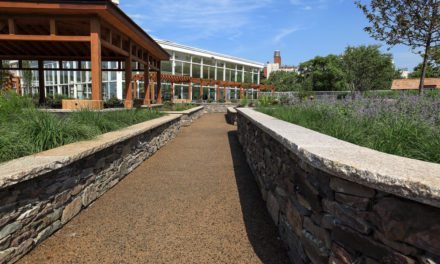ASLA’s policy recommendations report, “Landscape Architects Design Vibrant, Resilient, and Just Communities for All–Recommendations for the Biden-Harris Administration,” has broad support from organizations within the landscape architecture profession.
The Landscape Architecture Foundation (LAF), the Black Landscape Architects Network (BlackLAN), the Council of Educators in Landscape Architecture (CELA), the Landscape Architectural Accreditation Board (LAAB), the Ian L. McHarg Center at UPenn, and Council of Landscape Architectural Registration Boards (CLARB) have all expressed support for policies enumerated in the report.
“The pandemic has revealed now more than ever the value of public open spaces: we are human beings and need to be outside and with other human beings. These policy recommendations provide overdue support to enable landscape architects to design healthy, accessible and equitable outdoor places for people to connect with nature and each other, and rebuild the public realm infrastructure.”
Barbara Deutsch, FASLA – CEO, Landscape Architecture Foundation
“The Black Landscape Architects Network (BlackLAN) Board of Directors supports the American Society of Landscape Architects (ASLA) policy recommendations submitted to the Biden-Harris Administration. As a community of Black landscape architecture students and professionals, we support actions that advance racial equality, spatial equity, and environmental justice. These recommendations reaffirm the importance of Black landscape architects as leaders and place makers who work within diverse ecologically and socially changing communities in our nation and globally.”
BlackLAN Board of Directors
“The Council of Educators in Landscape Architecture (CELA), as a part of our mission to support educators to advance the profession, strongly supports the policy recommendations presented by the American Society of Landscape Architects (ASLA) on behalf of all landscape architects. We believe that these recommendations are the foundation for healthy, equitable and sustainable communities in the U.S.A. and the World.”
Sadik C. Artunc, FASLA – President, Council of Educators in Landscape Architecture (CELA)
“The Landscape Architectural Accreditation Board (LAAB) fully supports ASLA’s recommendations to the Biden-Harris Administration, particularly the focus on STEM, climate change, and racial, social, and environmental justice which directly align with the recent revisions of LAAB’s Accreditation Standards. These standards ensure that graduates of accredited landscape architecture degree programs are prepared to address the critical contemporary issues facing our country.”
The Landscape Architectural Accreditation Board (LAAB)
“Rebuilding this country—literally and metaphorically—is an all-hands on-deck moment. To do it well, we’ll need landscape architects throughout the Administration, working together with technical experts, movement leaders, and workers to develop bold new approaches to climate, racial, and economic justice through the project management of this country’s infrastructure and public works. ASLA’s policy recommendations will help make this possible.”
Billy Fleming, Wilks Family Director, Ian L. McHarg Center – University of Pennsylvania
“The Council of Landscape Architectural Registration Boards (CLARB) works to protect the public’s health, safety, and welfare through establishing and promoting professional licensure standards of landscape architects, in addition to administering the Landscape Architect Registration Examination (L.A.R.E.) which is a requirement for licensure in the United States. CLARB supports ASLA’s efforts to ensure state licensing standards remain rigorous, accessible, and in the interest of public protection, so the profession can continue its critical work in serving the public through the natural and built environment.”
Matt Miller – Chief Executive Officer, Council of Landscape Architectural Registration Boards (CLARB)



